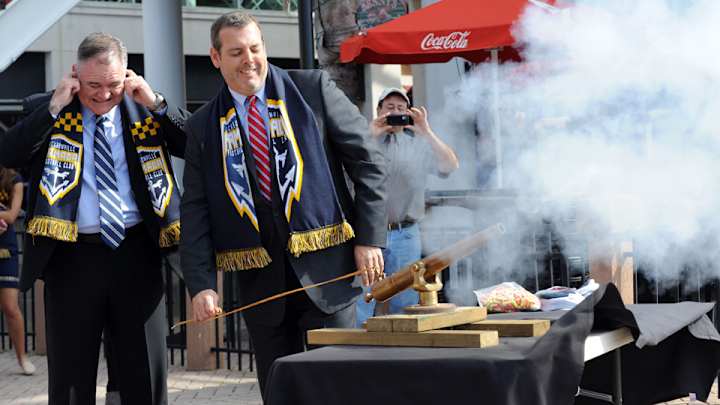NASL's response to MLS: Promotion-relegation is viable in North America

Major League Soccer president Mark Abbott asserts that the league will never adopt promotion and relegation, but North American Soccer League commissioner Bill Peterson has a differing viewpoint. Peterson tells SI.com that promotion and relegation could be a viable concept in North America and asserts that a European-style model could be successful and appreciated by American fans.
Peterson, who runs U.S. Soccer's second-tier league whose teams have plenty to gain from the notion of promotion, has long been a proponent of the system, and he reiterated that belief in a phone interview Wednesday.
MLS All-Star Notes: Mark Abbott on expansion, Blatter; Training contrast
“There’s no denying the excitement it creates, not only following the top of the table but following the middle and bottom of the table as well in some of these leagues around the world,” Peterson said. “We find that to be very, very interesting, so we remain very open to that concept. It’s not something that we’re looking to do today. … We won’t comment on what others say, but we also want people to be clear that we’re still open to it. The concept that there will never be promotion and relegation in North America, we disagree with.”
NASL has gone as far as any league toward instituting more of a worldwide model based on an open market. After clearing the initial hurdle of establishing a franchise, a process that closely mirrors what MLS has in place, teams are free to spend as they see fit, Peterson said.
“We’re completely de-centralized. Our owners are responsible for their own success on the field and off the field. Our technical staffs are responsible for securing the best players they possibly can at the right value, so you won’t see us implementing any drafts or Designated Players or anything like that because we’re not a single-entity system, so there’s no need to do that,” he said. “Our owners are competing with themselves to be competitive on the field. Again, it goes back to that’s what the fans want, and it’s really one of the reasons this league was started was that the founders believed that soccer should be organized in a similar fashion as it is in the rest of the world.”
BIRD: U.S. Soccer youth development has come a ways, but has a ways to go
For some teams in the league, such as the rebirth of the New York Cosmos, that means delving into deep pockets. Others, including expansion side Indy Eleven, make money off their business model and reinvest that in player acquisitions.
“[NASL] owners understand the vision and are very passionate about our vision. Part of that vision is, don’t spend more than you make,” Peterson said. “We’re running businesses, and we’ve got a great group of owners that understand that the long-term success of this league is based on being successful financially, so we have teams already that are profitable in less than three years. We expect all of them to be at that point very soon, and so they’re demonstrating that they know how to put a sound business together and how to manage themselves.”
The league currently comprises 10 teams, moving to 12 next year with new franchises in Jacksonville, Fla., and Oklahoma City and 13 when the Virginia Cavalry join. Virginia has had stadium and ownership issues, and while the team was originally scheduled to begin play in 2014, that has been pushed back to 2016.
Eventually, the league wants to expand to 18 teams, Peterson said, before reassessing whether it will move to 20.
“We have been public in saying that there is a focus on doing some things in the Midwest and the West, but we’re not excluding the East Coast,” he said. “We’re in conversations across North America, including Canada.”
As U.S. Soccer’s sanctioned second-division competition, NASL has seen success in the U.S. Open Cup against MLS teams. The Atlanta Silverbacks and Carolina RailHawks made runs into the quarterfinals before falling, each defeating MLS teams in the two rounds prior to their exit.
MORE: Union or FC Dallas will host U.S. Open Cup final
Peterson said in April that he has lobbied CONCACAF for an automatic berth into the region’s Champions League competition. League attendance is on the rise, helped by the fact that the team in Indianapolis posted the highest attendance in every week in which it played at home, and the future looks bright, the commissioner said.
“We’ve grown over 30 percent from last year just in attendance alone. People are reacting positively to that, so we have to keep doing what we’re doing,” Peterson said. “We have to promote what we’re doing. We have to continue to allow our technical staffs to find the best players and bring those together with great coaches and be very competitive.”
